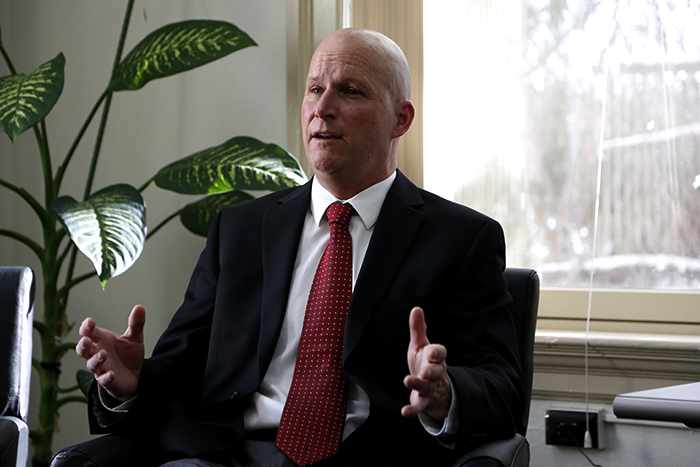Digital degrees are valuable
RYAN PUGH | The Daily Evergreen
David Cillay, vice president for academic outreach and innovation, supports the Global Campus and students who take advantage of it.
March 7, 2017
Online university education is, to many, the ugly stepchild of the traditional four-year degree on a university campus. There is an undeniable stigma to earning a degree online; the University of Phoenix and other for-profit universities made sure of that.
However, the landscape of digital education is changing. The Babson Survey Research Group reported in 2016 that private for-profit institution enrollment had dropped by 2.8 percent compared to the previous year. Moreover, public institutions possess the largest proportion of online distance students, 72.7 percent of undergraduate students and 38.7 percent of graduate students respectively.
Due to the advances in technology and the chronic problems of for-profit education, the expansion of online public university programs is a positive development in distance degrees.
WSU’s version of internet education is the Global Campus, established in 2012 as the digital edition of the university’s land grant mission. At present, the Global Campus offers eight undergraduate programs, 12 graduate programs, 12 non-degree certificates and three teaching endorsements.
David Cillay, vice president for academic outreach and innovation, stressed the consistency between any online degree and a campus-based degree.
“We really tried to create a program that discouraged students from just clicking a link,” Cillay said. “[The Global Campus] is an extension of WSU — it’s an extension of the physical campus.”
Cillay noted that though most online students are transfer students with credits from other institutions, a growing number of freshmen and students taking classes at physical WSU campuses are taking advantage of online courses.
“We have just about 3,000 online-only students and around 1,500 campus-based students,” Cillay said.
A potential criticism is that an online degree, especially for someone without a campus-based education, robs a person of the “college experience.” However, the Global Campus possesses its own ASWSU — ASWSU-Global Campus — with an executive board, sponsored activities and all the normal student services, like financial aid and career services.
Another critique of online education is the room for cheating. Derek Newton of The Atlantic reported in 2015 about the proliferation of online cheating accompanying the astronomical growth of the online higher education.
“But the fight isn’t hopeless,” Newton wrote. “There are steps colleges and online education companies can take to cut down on online impersonation. Infusing online courses with more direct engagement between teacher and student — using video technology, for example — can help.”
However, U.S. News ranked WSU’s online bachelor’s programs among the top 15 in the nation. This metric includes an analysis of student engagement with the instructor and with peers, which helps reduce the amount of dishonest academic activities.
New infrastructure, such as the new Digital Classroom Building, will assist in projecting not just faculty into home-based classrooms, but students from near and wide into WSU campuses.
Moreover, cheating is neither unique nor isolated to online degrees. At the end of the day, cheating harms only the student because it means students do not acquire skills or gain knowledge. This, in turn, means the value of tuition dollars does not return to the student.
Finally, and perhaps most importantly, WSU online degree programs are subject to scrutiny that rivals if not exceeds, that of campus-based degree programs. Cillay noted the several step process for online degree program approval, which involves the department, college, Faculty Senate, provost, president and accreditors.
The Global Campus represents a natural 21st century outgrowth of WSU’s land grant mission. For many, the privilege of attending university at any of WSU’s campuses is not a material or logistical possibility. The Global Campus equalizes the playing field so individuals with the will to do so can graduate in crimson and gray.
Tyler Laferriere is a graduate student pursuing his master’s in economics from Phoenix, Arizona. He can be contacted at 335-2290 or by [email protected]. The opinions expressed in this column are not necessarily those of the staff of The Daily Evergreen or those of The Office of Student Media.






















